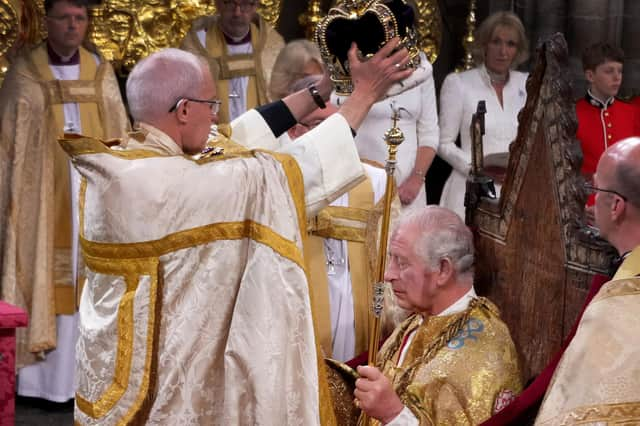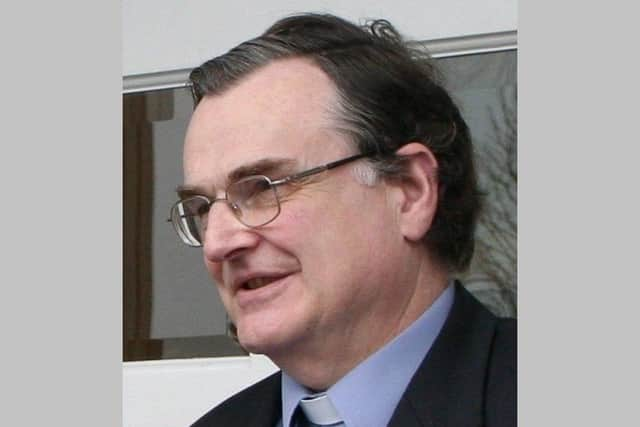Ian Ellis: Archbishop Justin Welby’s valuable contribution to the debate on British identity


The association says it has played “a major role in promoting good relations between the governments and peoples of the UK and Ireland”, yet in certain circles there is a feeling that it is not listening to the full range of unionist voices.
It is, no doubt, a useful idea, and has charitable status. However, it does need all sections of political life to have full confidence in its work.
Advertisement
Hide AdAdvertisement
Hide AdOne of the speakers at a BIA conference last month was Archbishop of Canterbury Justin Welby, who several years ago was involved in controversy over unpublicised Lambeth Palace talks on legacy issues, reportedly without proper representation of terror victims (News Letter, December 4, 2020).


Over many years, I have seen the archbishop at work in the Church of England's twice-yearly general synod meetings which I attended in a press capacity.
In addition to being present at these synodical gatherings, I used to meet many Church of England representatives at ecumenical gatherings as a Church of Ireland representative.
Then again, as a younger cleric I used to spend summer holidays doing locum in English parishes. Over the years I did so in many parishes from The North Riding of Yorkshire, to Kent, to Gloucester, and places in between.
Advertisement
Hide AdAdvertisement
Hide AdTwo things that always struck me about the Church of England were the fact that it is has a wide spectrum of very genuine spirituality, and the way it is full of great talent and abilities.
Archbishop Welby is well known to have been involved in the oil industry before he took Holy Orders and he has undoubtedly brought that valuable experience of life to the management and governance of the church.
Many clergy, like myself, have gone straight to ordination after university, but I have always felt that in the church's ministry itself one sees so much of life and I have personally never missed having a different profession before ordination.
No doubt both routes have their advantages and whichever route one takes to ordination, in whatever denomination, it is always determined by a spiritual vocation.
Advertisement
Hide AdAdvertisement
Hide AdNotwithstanding the reservations referred to about the Lambeth Palace talks and indeed the BIA itself, Archbishop Welby's recent address to the association was a valuable reflection. He focused largely on British identity, and framed it in both traditional and very contemporary terms.
Regarding of our identity today, he described the UK as a nation that saw its banking system collapse only 15 years ago, and as a nation that freely chose Brexit (while acknowledging that Scotland and Northern Ireland voted differently).
He described Brexit as “the single most important impact on our identity and foreign policy vision since the withdrawal from Empire”, but also said that while it had created deep divisions, these were slowly healing.
Of course, here in Northern Ireland the healing is proving particularly difficult, with no agreement on restoring devolved government.
Advertisement
Hide AdAdvertisement
Hide AdIn his address, Archbishop Welby also described the UK today in post-Covid terms, as “fighting a huge European war at one remove”, and as facing the long-term existential threat of climate change, “with the best estimate of side effects being a 7-10 fold increase in the number of world refugees to one billion, and multiple wars as a result”.
Turning to our national character and sense of purpose, he remarked that character changes with events, adding: “When large scale threats abound, then it is infinitely harder to look outwards and be generous: leadership goes to a premium, but may be for good or for ill.”
He also said that for some in the UK, the Empire gave a sense of calling, but also pointed out that, in terms of good and bad, it “gave rise to heroism and villainy, to brutality and generous humanitarian sacrifice”.
In a more traditional vein, Archbishop Welby recalled the coronation of King Charles last May, which he said had “consciously and deliberately” drawn on British history.
Advertisement
Hide AdAdvertisement
Hide AdHe continued: “The presentation of regalia, the crowning, the communion, the robes and shape of the use of the Abbey deliberately reflected the images of 1953 and the late Queen. Ceremonial and colour, the heralds, the recognition, can in some cases be traced back to the coronation of Edgar in 973.”
On the matter of Christianity in contemporary British life, the archbishop referred to how The Times had been commenting on how Christian and indeed all religious faith have seen a dramatic decline.
His comment on this was striking.
Taking a rather sanguine approach, he said that the record of decline “is not all bad, for churches are ruined when wealth and power lead them to self-reliance”.
While it is no doubt true that prosperity has its inherent dangers, with all the potential for self-satisfaction and even smugness, church decline needs serious addressing if the institutions really care about the future.
Advertisement
Hide AdAdvertisement
Hide AdOverall, Archbishop Welby's address clearly showed how identity must not be seen only in terms of the past because we are also shaped as people by the present.
l Canon Ian Ellis is a former editor of The Church of Ireland Gazette.